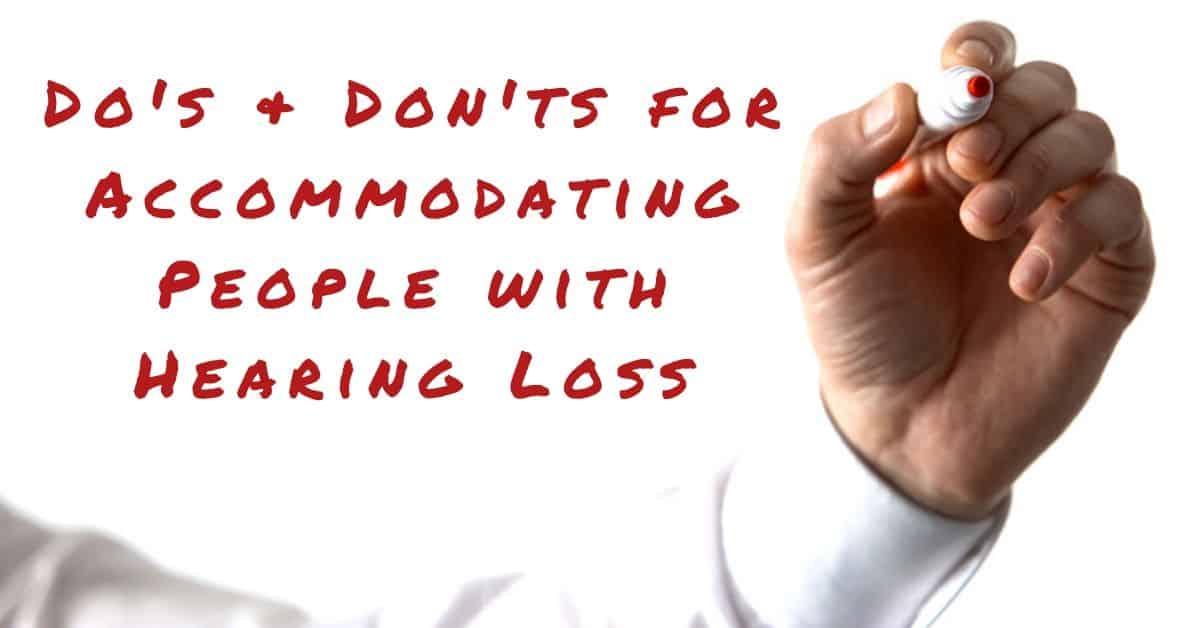
Hearing loss affects roughly 48 million Americans of all ages, so there’s a good chance you know at least one person who’s struggling to hear. You want to help your friend or loved one communicate easily, and have no trouble participating in conversations, but there are a few do’s and don’ts you need to know when it comes to accommodating people with hearing loss.
Conversation Don’ts
You want the people in your life with hearing loss to feel like part of the community, and you want to make sure they feel included in all the conversations. While you might be tempted to bend over backwards to help them hear, watch out for these conversations don’ts that could be doing more harm than good.
- Don’t Shout: No one likes to be yelled at, and people with hearing loss are no exception. You can raise your volume when talking with a friend with hearing loss, but never shout. Shouting can distort sounds and will actually make it harder for someone with hearing loss understand what’s been said. Rather than raising your volume, speak at a consistent speed and volume to help your friend hear.
- Don’t Cover Your Mouth: We all like talking with our hands, but if you’re speaking to someone with hearing loss, keep your hands away from your face. People with hearing loss often rely on facial expressions or lip reading to help them understand what’s been said, so don’t cover your mouth, speak while chewing, or exaggerate your lip movements.
- Don’t Repeat: Your friend or loved one with hearing loss often asks you to repeat what you or someone else has said, but if they didn’t hear it the first time, they might not catch it the second or third time either. Rather than repeating what was said word for word, rephrase what’s been said and give your friend a better chance of connecting the dots.
- Don’t All Speak at Once: Nothing is harder for people with hearing loss than following conversations in places with a lot of background noise. Make it easier for your friend to hear, and take turns speaking! When several people are talking all at once, someone with hearing loss won’t be able to follow any of the conversations, and will feel socially isolated and excluded.
Conversation Do’s
There are a number of things you can do to help people with hearing loss follow conversations. Practice these conversation do’s and encourage your friends to do the same.
- Do Get Their Attention: When having a conversation with someone with hearing loss, get their attention before speaking. If they don’t realize you’re talking to them until you’re halfway through a sentence, they’re going to have a much harder time catching up, and understanding what you’ve said. Say their name, tap them on the shoulder to get their attention, and make sure they’re facing you before you start speaking.
- Do Turn Down the Volume: To accommodate someone with hearing loss, turn down the volume on background music! Sure, the music might add to the ambiance, but if your friend is struggling to hear, all that background noise is making it harder for them to follow conversations.
- Do Ask How You Can Help: Each person experiences hearing loss in a unique way, so ask how you can help your friend accommodate their hearing loss. They may ask you to stand on the side of their good ear, or ask to switch seats with you to get further away from distracting sounds.
Encourage Your Friend to Wear Hearing Aids
Help your friend with hearing loss hear clearly with these do’s and don’ts for accommodating people with hearing loss, then encourage them to learn more about their hearing health. After a hearing test to find out exactly what they aren’t hearing, a modern pair of hearing aids will help them hear conversations with ease. They’ll be able to follow what’s been said even in places with a lot of background noise, and they won’t need to ask you to repeat yourself after every sentence. Treating hearing loss will help them be more socially engaged, stave off feelings of isolation and loneliness, and allow them to connect with people in a whole new way.
